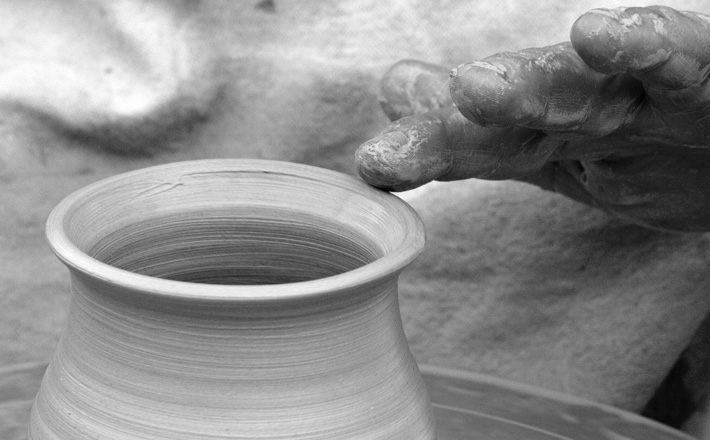Commentary on Psalm 1
Albeit an unlikely starting point, the place to begin any discussion of this short psalm is at the poem’s end:
for the LORD watches over the way of the righteous,
but the way of the wicked will perish. (Psalm 1:6, NRSV)
The contrast could not be starker. The LORD oversees the way of the righteous, guiding that person in a path that leads to a blessed life. The wicked, on the other hand, will perish on their way by virtue of the fact that they have chosen a different path upon which to travel. The NRSV’s translation of the word ?abad as “perish” conforms to the most frequent use of the word. The verb, however, sometimes carries with it connotations of straying away (1 Samuel 9:3) or wandering about (Deuteronomy 26:5). The fate of the wicked, therefore, is not here a consequence of any divine decision; the wicked simply choose to go their own way and, in so doing, become lost and perish.
No one need perish, of course. The psalmist contrasts a happy person, a blessed individual, in verses 1 to 3 with the wicked in verses 4 and 5.
First the happy person’s behavior is characterized by guarding herself from any misstep by not following the advice of the wicked, by not taking up the sinner’s path (derek, the word that twice appears as “way” in verse 6), and by not sitting in the seat of scoffers. Instead, the happy person finds herself delighting on a different sort of advice, namely the law of the LORD (verse 2). The translation of the Hebrew tôrah as “law” constricts a word that also includes the notions of teaching, instruction, and even decisions.
The happy person is the one who delights in the teachings of the LORD. Indeed, she meditates on it or, as the New Jerusalem Bible helpfully translates, she “murmurs his law day and night.” That translation wonderfully reflects the Hebrew verb hagah, or a pondering that involves making a sound. We should think of a person so enraptured by the teachings of the LORD that she goes about her daily tasks talking to herself about them!
As a consequence of her attention to the instruction of the LORD, the blessed person will be like a tree planted by a channel of water. There may be some poetic play with the image of the verdant tree appearing in verse 3 and the wording of verse 1. There, the happy person is told not to follow (literally, “walk”) in the “advice” of the wicked. The word that is quite properly translated as “advice” is understood as “trees” in Jeremiah 6:6.
Whether or not the poet was intentionally hinting already at the image of the tree in verse 1, the metaphor of a flourishing tree nourished by water that appears in verse 3 was a familiar one in ancient Israel (Jeremiah 17:7-8; Psalm 92:12-13). Moreover, the Holy Land is a territory so arid that, even today, channels of flowing water might suggest prosperity (see Job 29:6; Psalm 65:9).
It is worth noting that the tree of verse 3 does not plant itself. Indeed, the text employs a passive participle to emphasize the point that the tree/happy person is set where she will remain fruitful, verdant, and prosperous — the inevitable function of a tree so propitiously planted. The fact that the tree is planted and well placed undermines any notion that the happy person precipitated her own prosperity by dodging the wicked or by marathon Bible study.
Naturally, faith formation has a better chance of taking root if we place ourselves in a position not to be seduced by the counsel of the wicked. Obviously, we are more likely to “bear fruit” if we place ourselves in a position to consider God’s word (Colossians 1:6). But none of that can serve as a formula or guarantee that we will likewise prosper. These verses are descriptive, not prescriptive. Everything forever depends on God’s grace.
Likewise, verse 4 and 5 are descriptive, not prescriptive, of the fate of the wicked. In perfect contrast to the enduring, life-giving, fertile tree, the wicked are likened to chaff driven before the wind. Here again the psalmist reaches for a familiar metaphor. The judgment of God is such that the wicked will be unable to endure, be they national antagonists (Isaiah 29:5; 17:13; 41:16; Psalm 83:13) or individual sinners (Hosea 13:3; Psalm 35:5; Matthew 3:12 // Luke 3:17).[1]
Indeed, the three characterizations of the righteous tree in verse 3 are matched by three descriptors of the wicked: without roots and devoid of value, chaff will be driven by the wind. They shall likewise fail to stand up under the judgment of God (?) and they shall fail before the congregation of the righteous. The word translated as congregation, ?e?â, sometimes appears in contexts where it means witness or testimony. A translation of the “testimony of the righteous” may therefore be possible, although the legal function of the congregation (?e?â) as judge does not make that suggestion necessary.[2]
Taken as a whole, the psalm serves as an invitation to the entire psalter, holding before the community of faith — and not just the individual — the hope and promise that blessings will come from delighting in the instruction of the LORD. In this respect, Psalm 119, thought by many to be an ending to an earlier, shorter version of the psalms, picks up where this psalm leaves off, thus forming an inclusio around the whole:
1 Happy are those whose way is blameless, who walk in the law of the LORD.
2 Happy are those who keep his decrees, who seek him with their whole heart,
3 who also do no wrong, but walk in his ways. (Psalm 119:1-3)
Finally, the psalm is well matched with both the Old Testament reading and the Gospel pericope assigned for the day in that all three texts draw a clear descriptive line between those who would walk in the way of the Lord and those who will not.


September 8, 2013